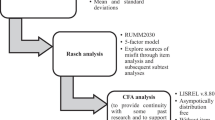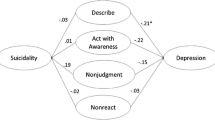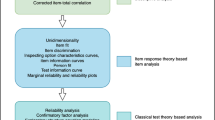Abstract
Objectives
This study aimed to evaluate the psychometric properties of a Sinhalese version of the Five Facet Mindfulness Questionnaire (FFMQ), including its factor structure, internal consistency and convergent validity, in an exclusively Buddhist population.
Methods
The FFMQ was translated to Sinhalese using forward and backward translation, expert consensus and pretesting. The translated questionnaire was administered to a sample of 415 nurses (90.8% female; mean age = 39 years; 100% Buddhists), from 4 hospitals in Sri Lanka. The Depression, Anxiety and Stress Scale (DASS)-21 was administered concurrently. A series of empirical factor models were tested for fit using confirmatory factor analysis (CFA). Exploratory factor analysis (EFA) was used to explore alternative factor structures. Internal consistency was measured using Cronbach α.
Results
The original five-factor structure, either as first-order or hierarchical models, showed poor fit in the present population. EFA supported a six-factor structure, where the original Actaware facet splits into two facets, namely, Distract and Autopilot. A 20-item short form composed of 3–4 items from each of the six facets, selected based on factor loadings and item-total correlations, showed excellent CFA model fit. Internal consistencies of the 20-item scale (α = 0.7) and the five subscales (α = 0.67–0.72) were satisfactory. Overall mindfulness showed moderate negative correlations with depression, anxiety and stress; and all facets except Observe and Describe correlated negatively with psychological problems.
Conclusions
Our findings endorse a six-factor structure of mindfulness, which had been proposed in a few previous studies. A modified 20-item short form with six facets shows satisfactory psychometric properties.


Similar content being viewed by others
Data Availability
All data are available at the Open Science Framework (https://osf.io/bxufw).
References
Agampodi, T., Katumuluwa, S., Pattiyakumbura, T., Rankaduwa, N., Dissanayaka, T., & Agampodi, S. (2018). Feasibility of incorporating mindfulness based mental health promotion to the pregnancy care program in Sri Lanka A pilot study. F1000Research, 7, 1850. https://doi.org/10.12688/f1000research.17049.2
Aguado, J., Luciano, J. V., Cebolla, A., Serrano-Blanco, A., Soler, J., & García-Campayo, J. (2015). Bifactor analysis and construct validity of the Five Facet Mindfulness Questionnaire (FFMQ) in non-clinical Spanish samples. Frontiers in Psychology, 6, 404. https://doi.org/10.3389/fpsyg.2015.00404
Aiken, L. R. (2000). Psychological testing and assessment (10th ed.). Allyn and Bacon.
Analayo, B. (2019). Mindfulness of breathing: Practice guide and translations. Windhorse Publications.
Arthur, D., Dizon, D., Jooste, K., Li, Z., Salvador, M., & Yao, X. (2017). Mindfulness in nursing students: The five facet mindfulness questionnaire in samples of nursing students in China, the Philippines, and South Africa. International Journal of Mental Health Nursing, 27(3), 975–986. https://doi.org/10.1111/inm.12405
Aspy, D. J., & Proeve, M. (2017). Mindfulness and loving-kindness meditation. Psychological Reports, 120(1), 102–117. https://doi.org/10.1177/0033294116685867
Baer, R. (2019). Assessment of mindfulness by self-report. Current Opinion in Psychology, 28, 42–48. https://doi.org/10.1016/j.copsyc.2018.10.015
Baer, R. A., Smith, G. T., & Allen, K. B. (2004). Assessment of mindfulness by self-report: The Kentucky inventory of mindfulness skills. Assessment, 11(3), 191–206. https://doi.org/10.1177/1073191104268029
Baer, R. A., Smith, G. T., Hopkins, J., Krietemeyer, J., & Toney, L. (2006). Using self-report assessment methods to explore facets of mindfulness. Assessment, 13(1), 27–45. https://doi.org/10.1177/1073191105283504
Baer, R. A., Smith, G. T., Lykins, E., Button, D., Krietemeyer, J., Sauer, S., Walsh, E., Duggan, D., & Williams, J. M. G. (2008). Construct validity of the Five Facet Mindfulness Questionnaire in meditating and nonmeditating samples. Assessment, 15(3), 329–342. https://doi.org/10.1177/1073191107313003
Baminiwatta, A., & Solangaarachchi, I. (2021). Trends and developments in mindfulness research over 55 years: A bibliometric analysis of publications indexed in Web of Science. Mindfulness, 12(9), 2099–2116. https://doi.org/10.1007/s12671-021-01681-x
Bandalos, D. L., & Finney, S. J. (2001). Item parceling issues in structural equation modeling. In G. A. Marcoulides & R. E. Schumacker (Eds.), New developments and techniques in structural equation modeling (pp. 269–296). Lawrence Erlbaum Associates Publishers.
Beaton, D. E., Bombardier, C., Guillemin, F., & Ferraz, M. B. (2000). Guidelines for the process of cross-cultural adaptation of self-report measures. Spine, 25(24), 3186–3191. https://doi.org/10.1097/00007632-200012150-00014
Bishop, S. R., Lau, M., Shapiro, S., Carlson, L., Anderson, N. D., Carmody, J., Segal, Z. V., Abbey, S., Speca, M., Velting, D., & Devins, G. (2004). Mindfulness: A proposed operational definition. Clinical Psychology: Science and Practice, 11(3), 230–241. https://doi.org/10.1093/clipsy.bph077
Bohlmeijer, E., ten Klooster, P. M., Fledderus, M., Veehof, M., & Baer, R. (2011). Psychometric properties of the Five Facet Mindfulness Questionnaire in depressed adults and development of a short form. Assessment, 18(3), 308–320. https://doi.org/10.1177/1073191111408231
Borkovec, T. D., & Inz, J. (1990). The nature of worry in generalized anxiety disorder: A predominance of thought activity. Behaviour Research and Therapy, 28(2), 153–158. https://doi.org/10.1016/0005-7967(90)90027-g
Brown, K. W., & Ryan, R. M. (2003). The benefits of being present: Mindfulness and its role in psychological well-being. Journal of Personality and Social Psychology, 84(4), 822–848. https://doi.org/10.1037/0022-3514.84.4.822
Buchheld, N., Grossman, P., & Walach, H. (2001). Measuring mindfulness in insight meditation (Vipassana) and meditation-based psychotherapy: The development of the Freiburg mindfulness inventory (FMI). Journal for Meditation and Meditation Research, 1, 11–34.
Carpenter, J. K., Conroy, K., Gomez, A. F., Curren, L. C., & Hofmann, S. G. (2019). The relationship between trait mindfulness and affective symptoms: A meta-analysis of the Five Facet Mindfulness Questionnaire (FFMQ). Clinical Psychology Review, 74, 101785. https://doi.org/10.1016/j.cpr.2019.101785
Chadwick, P., Hember, M., Mead, S., Lilley, B., & Dagnan, D. (2005). Responding mindfully to unpleasant thoughts and images: Reliability and validity of the mindfulness questionnaire. Assessment, 11, 206–216. https://doi.org/10.1348/014466508X314891
Christopher, M. S., Charoensuk, S., Gilbert, B. D., Neary, T. J., & Pearce, K. L. (2009). Mindfulness in Thailand and the United States: A case of apples versus oranges? Journal of Clinical Psychology, 65(6), 590–612. https://doi.org/10.1002/jclp.20580
Christopher, M. S., Neuser, N. J., Michael, P. G., & Baitmangalkar, A. (2012). Exploring the psychometric properties of the Five Facet Mindfulness Questionnaire. Mindfulness, 3(2), 124–131. https://doi.org/10.1007/s12671-011-0086-x
Christopher, M. S., Woodrich, L. E., & Tiernan, K. A. (2014). Using cognitive interviews to assess the cultural validity of state and trait measures of mindfulness among Zen Buddhists. Mindfulness, 5(2), 145–160. https://doi.org/10.1007/s12671-012-0160-z
De Zoysa, P. (2010). The practice of mindfulness based behavior therapy in Sri Lanka. Sri Lanka Journal of Psychiatry, 1(2), 67–69. https://doi.org/10.4038/sljpsyc.v1i2.2579
De Zoysa, P. (2011). The use of Buddhist mindfulness meditation in psychotherapy: A case report from Sri Lanka. Transcultural Psychiatry, 48(5), 675–683. https://doi.org/10.1177/1363461511418394
Della, C. D., Teo, D. C. L., Agiananda, F., & Nimnuan, C. (2021). Culturally informed psychotherapy in Asian consultation-liaison psychiatry. Asia-Pacific Psychiatry, 13(1), e12431. https://doi.org/10.1111/appy.12431
Deng, Y.-Q., Li, S., Tang, Y.-Y., Zhu, L.-H., Ryan, R., & Brown, K. (2011). Psychometric properties of the Chinese translation of the Mindful Attention Awareness Scale (MAAS). Mindfulness, 3(1), 10–14. https://doi.org/10.1007/s12671-011-0074-1
Feldman, G., Hayes, A., Kumar, S., Greeson, J., & Laurenceau, J.-P. (2006). Mindfulness and emotion regulation: The development and initial validation of the Cognitive and Affective Mindfulness Scale-Revised (CAMS-R). Journal of Psychopathology and Behavioral Assessment, 29(3), 177. https://doi.org/10.1007/s10862-006-9035-8
Feng, X., Krägeloh, C., Billington, R., & Siegert, R. (2018). To what extent is mindfulness as presented in commonly used mindfulness questionnaires different from how it is conceptualized by senior ordained Buddhists? Mindfulness, 9(2), 1–20. https://doi.org/10.1007/s12671-017-0788-9
Fernandez, A. C., Wood, M. D., Stein, L. A. R., & Rossi, J. S. (2010). Measuring mindfulness and examining its relationship with alcohol use and negative consequences. Psychology of Addictive Behaviors, 24(4), 608–616. https://doi.org/10.1037/a0021742
Fong, T. C. T., Wan, A. H. Y., Wong, V. P. Y., & Ho, R. T. H. (2021). Psychometric properties of the Chinese version of Five Facet Mindfulness Questionnaire—short form in cancer patients: A Bayesian structural equation modeling approach. Health and Quality of Life Outcomes, 19(1), 51. https://doi.org/10.1186/s12955-021-01692-1
Freeman, M. A. (1997). Demographic correlates of individualism and collectivism: A study of social values in Sri Lanka. Journal of Cross-Cultural Psychology, 28(3), 321–341. https://doi.org/10.1177/0022022197283007
Giovannini, C., Giromini, L., Bonalume, L., Tagini, A., Lang, M., & Amadei, G. (2014). The Italian Five Facet Mindfulness Questionnaire: A contribution to its validity and reliability. Journal of Psychopathology and Behavioral Assessment, 36(3), 415–423. https://doi.org/10.1007/s10862-013-9403-0
Gray, J. A. (2004). Consciousness: Creeping up on the hard problem. Oxford University Press.
Gunaratana, B. (2017). Loving-kindness in plain English: The practice of Metta. Wisdom Publications.
Gunathilaka, N., Chandradasa, M., Champika, L., Siriwardana, S., & Wijesooriya, L. (2018). Delayed anxiety and depressive morbidity among dengue patients in a multi-ethnic urban setting: First report from Sri Lanka. International Journal of Mental Health Systems, 12, 20. https://doi.org/10.1186/s13033-018-0202-6
Haas, B., & Akamatsu, Y. (2019). Psychometric investigation of the five facets of mindfulness and well-being measures in the Kingdom of Bhutan and the USA. Mindfulness, 10(1), 1339–1351. https://doi.org/10.1007/s12671-018-1089-7
Hayton, J. C., Allen, D. G., & Scarpello, V. (2004). Factor retention decisions in exploratory factor analysis: A tutorial on parallel analysis. Organizational Research Methods, 7(2), 191–205. https://doi.org/10.1177/1094428104263675
Horn, J. L. (1965). A rationale and test for the number of factors in factor analysis. Psychometrika, 30(2), 179–185. https://doi.org/10.1007/BF02289447
Hou, J., Wong, S., Lo, H. H. M., Mak, W., & Ma, H. (2013). Validation of a Chinese version of the Five Facet Mindfulness Questionnaire in Hong Kong and development of a short form. Assessment, 21(3), 363–371. https://doi.org/10.1177/1073191113485121
Hu, L., & Bentler, P. M. (1999). Cutoff criteria for fit indexes in covariance structure analysis: Conventional criteria versus new alternatives. Structural Equation Modeling: A Multidisciplinary Journal, 6(1), 1–55. https://doi.org/10.1080/10705519909540118
Islam, M. A., & Siddique, S. (2016). Validation of the Bangla Mindful Attention Awareness Scale. Asian Journal of Psychiatry, 24, 10–16. https://doi.org/10.1016/j.ajp.2016.08.011
Jermann, F., Billieux, J., Larøi, F., d’Argembeau, A., Bondolfi, G., Zermatten, A., & Van der Linden, M. (2009). Mindful Attention Awareness Scale (MAAS): Psychometric properties of the French translation and exploration of its relations with emotion regulation strategies. Psychological Assessment, 21(4), 506–514. https://doi.org/10.1037/a0017032
Karl, J. A., Prado, S. M. M., Gračanin, A., Verhaeghen, P., Ramos, A., Mandal, S. P., Michalak, J., Zhang, C.-Q., Schmidt, C., Tran, U. S., Druica, E., Solem, S., Astani, A., Liu, X., Luciano, J. V., Tkalčić, M., Lilja, J. L., Dundas, I., Wong, S. Y. S., & Fischer, R. (2020). The cross-cultural validity of the Five-Facet Mindfulness Questionnaire across 16 countries. Mindfulness, 11(5), 1226–1237. https://doi.org/10.1007/s12671-020-01333-6
Kitayama, S., Markus, H. R., Matsumoto, H., & Norasakkunkit, V. (1997). Individual and collective processes in the construction of the self: Self-enhancement in the United States and self-criticism in Japan. Journal of Personality and Social Psychology, 72(6), 1245–1267. https://doi.org/10.1037/0022-3514.72.6.1245
Lecuona, O., García-Rubio, C., de Rivas, S., Moreno-Jiménez, J. E., Meda-Lara, R. M., & Rodríguez-Carvajal, R. (2021). A network analysis of the Five Facets Mindfulness Questionnaire (FFMQ). Mindfulness, 12(9), 2281–2294. https://doi.org/10.1007/s12671-021-01704-7
Lo, C. (2014). Cultural Values and Alexithymia. SAGE Open, 4(4), 2158244014555117. https://doi.org/10.1177/2158244014555117
Lovibond, P. F., & Lovibond, S. H. (1995). The structure of negative emotional states: Comparison of the Depression Anxiety Stress Scales (DASS) with the Beck Depression and Anxiety Inventories. Behaviour Research and Therapy, 33(3), 335–343. https://doi.org/10.1016/0005-7967(94)00075-U
Mattes, J. (2019). Systematic review and meta-analysis of correlates of FFMQ mindfulness facets. Frontiers in Psychology, 10, 2684. https://doi.org/10.3389/fpsyg.2019.02684
Meade, A. W., & Bauer, D. J. (2007). Power and precision in confirmatory factor analytic tests of measurement invariance. Structural Equation Modeling: A Multidisciplinary Journal, 14(4), 611–635. https://doi.org/10.1080/10705510701575461
Meng, Y., Mao, K., & Li, C. (2020). Validation of a short-form Five Facet Mindfulness Questionnaire instrument in China. Frontiers in Psychology, 10, 3031. https://doi.org/10.3389/fpsyg.2019.03031
Neuser, N. J. (2010). Examining the factors of mindfulness: A confirmatory factor analysis of the Five Facet Mindfulness Questionnaire [Doctoral dissertation, Pacific University]. Pacific University Research Repository. http://commons.pacificu.edu/spp/128
Norman, G. R., & Streiner, D. L. (2014). Biostatistics: The bare essentials (4th ed.). People’s Medical Publishing.
Pandey, R., & Mandal, S. (2016). Validation of the factor structure of the Five Facet Mindfulness Questionnaire. Health and Social Care Chaplaincy, 7(1), 61–66.
Park, T., Reilly-Spong, M., & Gross, C. R. (2013). Mindfulness: A systematic review of instruments to measure an emergent patient-reported outcome (PRO). Quality of Life Research, 22(10), 2639–2659. https://doi.org/10.1007/s11136-013-0395-8
Parmentier, F. B. R., García-Toro, M., García-Campayo, J., Yañez, A. M., Andrés, P., & Gili, M. (2019). Mindfulness and symptoms of depression and anxiety in the general population: The mediating roles of worry, rumination, reappraisal and suppression. Frontiers in Psychology, 10, 506. https://doi.org/10.3389/fpsyg.2019.00506
Ponterotto, J. G., & Ruckdeschel, D. E. (2007). An overview of coefficient alpha and a reliability matrix for estimating adequacy of internal consistency coefficients with psychological research measures. Perceptual and Motor Skills, 105(3), 997–1014. https://doi.org/10.2466/pms.105.3.997-1014
Raphiphatthana, B., Jose, P. E., & Chobthamkit, P. (2019). The association between mindfulness and grit: An East vs. West Cross-Cultural Comparison Mindfulness, 10(1), 146–158. https://doi.org/10.1007/s12671-018-0961-9
Raubenheimer, J. (2004). An item selection procedure to maximise scale reliability and validity. SA Journal of Industrial Psychology, 30(4), 59–64. https://doi.org/10.4102/Sajip.V30i4.168
Rekha, A. V. (2012). Adaptation and validation of the Depression, Anxiety, and Stress Scale (DASS21) among students of the University of Colombo [Paper Presentation]. Annual Research Symposium 2012, University of Colombo, Colombo, Sri Lanka. http://archive.cmb.ac.lk:8080/research/handle/70130/3898
Rosenzweig, D. (2013). The sisters of mindfulness. Journal of Clinical Psychology, 69(8), 793–804. https://doi.org/10.1002/jclp.22015
Rudkin, E., Medvedev, O., & Siegert, R. (2018). The Five-Facet Mindfulness Questionnaire: Why the observing subscale does not predict psychological symptoms. Mindfulness, 9(1), 230–242. https://doi.org/10.1007/s12671-017-0766-2
Sayadaw, M. (1971). Practical insight meditation: Basic and progressive stages. Buddhist Publication Society.
Smith, G. T., McCarthy, D. M., & Anderson, K. G. (2000). On the sins of short-form development. Psychological Assessment, 12(1), 102–111. https://doi.org/10.1037//1040-3590.12.1.102
Sugiura, Y., Sato, A., Ito, Y., & Murakami, H. (2012). Development and validation of the Japanese version of the Five Facet Mindfulness Questionnaire. Mindfulness, 3(2), 85–94. https://doi.org/10.1007/s12671-011-0082-1
Tilakaratne, A. (2021). The study of Buddhism in Sri Lanka: Issues, challenges and prospects. University of Colombo Review, 2(1), 17–28. https://doi.org/10.4038/ucr.v2i1.36
Tran, U. S., Glück, T. M., & Nader, I. W. (2013). Investigating the Five Facet Mindfulness Questionnaire (FFMQ): Construction of a short form and evidence of a two-factor higher order structure of mindfulness. Journal of Clinical Psychology, 69(9), 951–965. https://doi.org/10.1002/jclp.21996
UNESCO. (n.d.). UNESCO World Heritage List. https://whc.unesco.org/en/list/200/
Van Dam, N. T., Hobkirk, A. L., Danoff-Burg, S., & Earleywine, M. (2012). Mind your words: Positive and negative items create method effects on the Five Facet Mindfulness Questionnaire. Assessment, 19(2), 198–204. https://doi.org/10.1177/1073191112438743
Veehof, M. M., Ten Klooster, P. M., Taal, E., Westerhof, G. J., & Bohlmeijer, E. T. (2011). Psychometric properties of the Dutch Five Facet Mindfulness Questionnaire (FFMQ) in patients with fibromyalgia. Clinical Rheumatology, 30(8), 1045–1054. https://doi.org/10.1007/s10067-011-1690-9
Worthington, R. L., & Whittaker, T. A. (2006). Scale development research: A content analysis and recommendations for best practices. The Counseling Psychologist, 34(6), 806–838. https://doi.org/10.1177/0011000006288127
Acknowledgements
We are grateful to the directors of the hospitals where the study was conducted, for authorising the data collection.
Author information
Authors and Affiliations
Contributions
AB conceptualised and designed the study, contributed to data acquisition, conducted the data analysis and wrote the first draft of the manuscript. HA, TN, KK and NCH contributed to study design, and data acquisition. All authors read and approved the final manuscript.
Corresponding author
Ethics declarations
Ethics Approval
Approval was obtained from the ethics review committee of Faculty of Medicine, University of Kelaniya. The procedures used in this study adhere to the tenets of the Declaration of Helsinki.
Conflict of Interest
The authors declare no competing interests.
Additional information
Publisher's Note
Springer Nature remains neutral with regard to jurisdictional claims in published maps and institutional affiliations.
Rights and permissions
About this article
Cite this article
Baminiwatta, A., Alahakoon, H., Herath, N.C. et al. Psychometric Evaluation of a Sinhalese Version of the Five Facet Mindfulness Questionnaire and Development of a Six-Facet Short Form in a Sri Lankan Buddhist Context. Mindfulness 13, 1069–1082 (2022). https://doi.org/10.1007/s12671-022-01863-1
Accepted:
Published:
Issue Date:
DOI: https://doi.org/10.1007/s12671-022-01863-1




